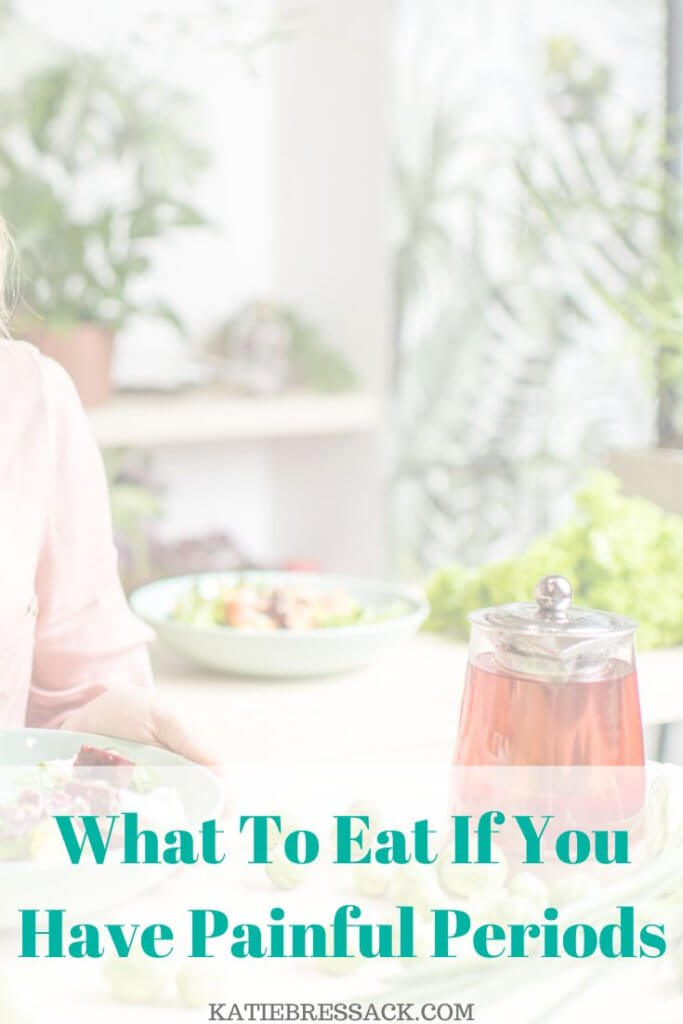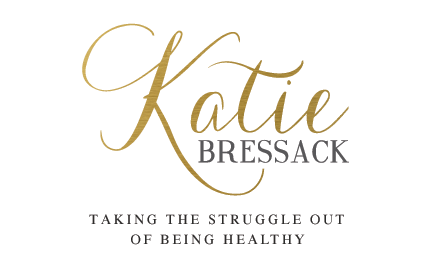If you have painful periods, you most likely dread menstruating every single month. Pain with periods can be common, but it doesn’t have to be your normal monthly occurrence! Unfortunately more than half of people who menstruate have some pain for one to two days each month. So what can we do to reduce your monthly period pain? What you eat can help reduce your painful periods and I’m sharing what to eat if you have painful periods.
Pain associated with menstruation is called dysmenorrhea. Usually, the pain is mild. However, some women experience excruciating pain which keeps them from going to work and doing their normal day to day activities which isn’t ideal at all.
There are two different types of dysmenorrhea:
- Primary dysmenorrhea occurs in people who experience pain before and during their period
- Secondary dysmenorrhea is when you’ve had normal periods that become painful later in life. It could be a condition affecting the uterus or other pelvic organs, such as endometriosis or uterine fibroids
What Causes Period Pain?
A hormone called prostaglandin triggers muscle contractions in your uterus that expel the lining. These contractions can cause pain and inflammation. The level of prostaglandin rises right before menstruation begins. Painful periods can also be caused by PMS, fibroids and endometriosis and you should discuss your painful periods with your doctor to see what next steps are best to support you.

What To Eat If You Have Painful Periods
- Focus on an anti-inflammatory diet. This diet favors fruits and vegetables, foods containing omega-3 fatty acids like salmon, whole grains, lean protein, healthful fats, and spices while reducing processed foods, seed oil and alcohol
- Notice what foods your body might be sensitive to including gluten, dairy, soy, corn, eggs, sugar and support your gut health by starting with an elimination diet to see how your body responds. A lot of my clients improve their PMS symptoms by supporting their gut health
- Try to eat lots of warm, cooked and nourishing foods when you have your period like curries and soups which are easier to digest
- Ginger is your friend. Drink lots of ginger tea and raspberry leaf tea two the week before your period and when you have your period. You can also add fresh ginger to meals
- Reduce alcohol, caffeine and sugar throughout your entire cycle, but especially the last two weeks of your cycle during the luteal phase and when you have your period
- Eliminate seed oils, which cause inflammation. Be sure to read labels as they appear in many packaged foods (even so called “healthy foods”).
- Stay hydrated, double your water intake so that your urine is almost clear
- Keep your blood sugar balanced and include proteins, fats and fibers at every meal. This is the first step in eating to support your hormones and has huge benefits for reducing painful periods
Supplements & CBD Can Help With Painful Periods
- Supplements can also help like Vitamin B 6, magnesium, fish oil, and make sure your Vitamin D levels are optimal. Read more about how supplements can support your period with my best supplements for your hormones. Always check with your doctor first before taking any new supplement
- CBD is another way to help reduce painful periods. There are a lot of health benefits of CBD oil for women’s health. CBD and CBD oils are known to have anti-inflammatory properties. There has been a lot of new research showing how CBD can help reduce endometriosis pain and painful periods. I use Green Compass CBD products as they are USDA organic certified. You can try these products for $10 off using this advocate ID: 258426
Self Care For Painful Periods
- Take a warm bath with epsom salt, I also love to add essential oils to the bath like lavender
- Try using castor oil packs
- A heating pad feels great on your belly to help reduce your period pain
- Try doing the yoga pose, legs up the wall. Here is a blog post showing you how to get into the best position
- Add in some restorative yoga moved, such as gentle twists, happy baby, cat and cow and child’s pose
- Gentle walks and other light physical activity
- Incorporate deep breathing and meditation, I love the free app Insight Timer
Next Steps
- If you are experiencing painful periods and are unable to go to work and engage in everyday activities because the pain is so severe, work with a doctor who checks for fibroids, discusses endometriosis and pelvic pain with you. A pelvic floor physical therapist is also a great resource to help navigate your painful periods with you.
- I’ve helped hundreds of women learn how to eat to reduce their painful periods as well as mood swings, cramps, PMS and fatigue. Join my five-week group program and learn how eating to support your hormones can help reduce your painful periods. You can learn more about this program here and reach out with any questions at katie@katiebressack.com
Sources
- Period Pain: NHS
- Dysmenorrhea Painful Periods: The American Association Of Obstetricians and Gynecologists
I’d love to hear your thoughts!
- Was this post helpful for you? Or, do you have any additional questions? Comment below and let me know!
- Share with your friends, forward this along or post on social. You can also join me on Instagram and in my private FB group
- Want a deeper look into your hormones? Take my quiz to see what foods might be helpful to add into your diet
- Sign up for my newsletter full of women’s health tips and get your FREE guide, the five steps to take today to help balance your hormones
Medical Disclaimer
Information in this post and on this web site is provided for informational purposes only. The information is a result of practice experience and research by the author. This information is not intended as a substitute for the advice provided by your physician or other healthcare professional or any information contained on or in any product label or packaging. Do not use the information on this web site for diagnosing or treating a health problem or disease, or prescribing medication or other treatment. Information and statements regarding dietary supplements have not been evaluated by the Food and Drug Administration and are not intended to diagnose, treat, cure, or prevent any disease. Always speak with your physician or other healthcare professional before taking any medication or nutritional, herbal or homeopathic supplement, or using any treatment for a health problem.

.png)
.png)
.png)
Very nice